Scope of Digital Marketing
It is broad and expanding, encompassing various career paths like SEO, content creation, and social media management, and offering services to businesses across all sectors.
1. Introduction: Why Digital Marketing Matters
In the age of smartphones, fast internet and everywhere-online consumers, the traditional marketing landscape is undergoing a profound shift. What once worked — print ads, billboards, TV spots — still has value, but the digital domain now offers scale, precision, measurability and interactivity in ways previously unimaginable. This is where digital marketing comes in: the practice of promoting products, services or brands via online and digital channels.
In effect, digital marketing bridges the gap between businesses and consumers in the digital age — enabling real-time interaction, data-driven decision-making, global reach and often lower cost of acquisition. The question is: What opportunities does it afford? How will it evolve? What is SEO These are the questions we will explore.
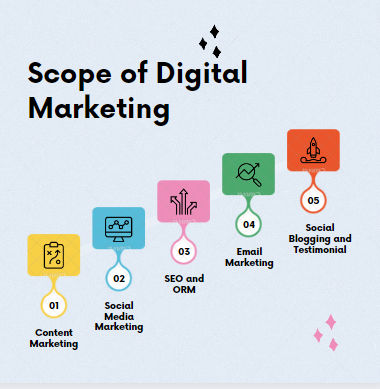
2. The Expanding Market: Why the Scope is Growing
Several macro-factors are driving the growth and scope of digital marketing:
a) Rising Internet & Mobile Penetration
In countries like India, Internet user base is surging — many millions of people access the internet via mobile devices, often for shopping, social media, entertainment and information. This means more people to reach, more data to derive insights from, and more potential customers for online campaigns.
b) Growth of E-Commerce and Online Services
As e-commerce platforms proliferate, as services move online (education, health, finance) and as digital payments become routine, businesses increasingly need digital marketing to reach and convert customers. One article notes that startups and SMEs are leveraging digital tools to reach national and international audiences.
c) Shift in Consumer Behaviour
Consumers are more digitally savvy: they research online, compare prices, read reviews, engage on social media, expect real-time responses. For example, digital marketing allows interactivity and immediacy that traditional marketing often cannot match.
d) Cost-effectiveness & Measurability
One of the big draws of digital marketing is that it often delivers higher ROI (return on investment) than many traditional forms — because you can target precisely, track results, adjust quickly. As one source says, digital marketing campaigns “offer both a greater and faster ROI.”
Together these factors mean the scope of digital marketing is widening: more roles, more specialisations, more business demand, more global opportunities.
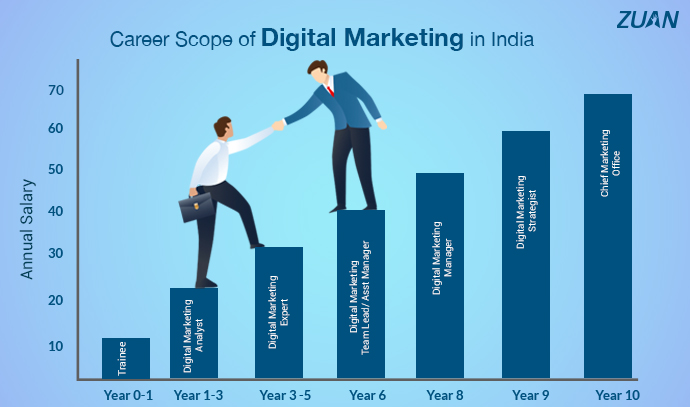
3. Key Dimensions of Scope: What “Scope” Actually Means
When we talk about the scope of digital marketing, it can mean various things:
- Career scope: What kinds of job roles, how many opportunities, salary potential, in different geographies (India, Tier-2/3 cities, global)
- Business scope: For organisations, what kinds of business growth, customer reach, cost savings, brand building opportunities exist via digital marketing
- Skill/education scope: What skills are needed, what educational/training paths exist, how specialisations and certifications matter
- Future scope: How emerging technologies (AI, automation, analytics, new platforms) will expand what digital marketers do, and what new frontiers will open
We’ll explore each of these dimensions in the following sections.
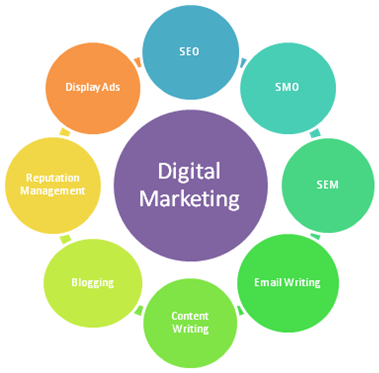
4. Career Scope of digital marketing: Roles, Opportunities & Salary Trends
a) Diverse Job Roles
There is no “one size fits all” in digital marketing. Some of the common roles include:
- SEO (Search Engine Optimisation) Specialist
- PPC (Pay-Per-Click) / Search Advertising Specialist
- Social Media Marketer / Manager
- Content Marketing Manager / Strategist
- Email Marketing Specialist
- Analytics Manager / Data-Driven Marketer
- E-commerce / Performance Marketing Manager
- Digital Marketing Manager / Head of Digital
Sources show that the digital marketing space offers a wide range of career paths.
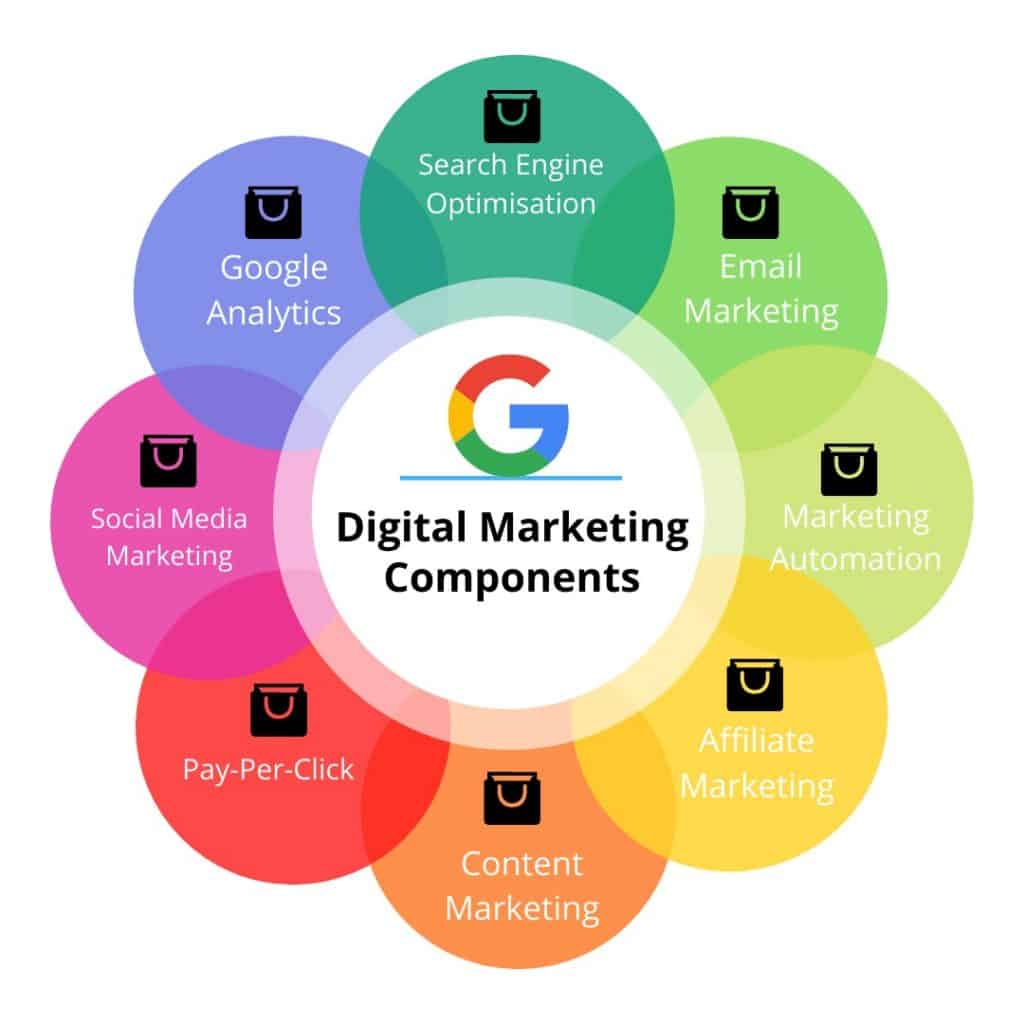
b) Salary & Growth Trends
In India, salaries for digital marketing professionals are improving: according to one source:
- Freshers: INR ~3-6 lakhs per annum
- Mid-level: ~6-12 lakhs
- Managers and specialist roles: ~12-25 lakhs+ and leadership can go higher.
- Another source reports freshers in India may start at ~₹2-4 lakhs per annum and progress with experience.
c) Opportunities Beyond Metros
Interestingly, digital marketing roles are not limited to large metro cities. Tier-2/3 cities are increasingly investing in digital presence, creating opportunities locally.
d) Freelancing, Remote Work & Entrepreneurship
An added dimension is that digital marketing skills lend themselves to freelancing or agency work, or starting one’s own online business. With remote work increasingly accepted, marketers can serve clients globally.
Thus, from a career standpoint, the scope is significant — provided one stays updated, acquires relevant skills and keeps pace with emerging tools.
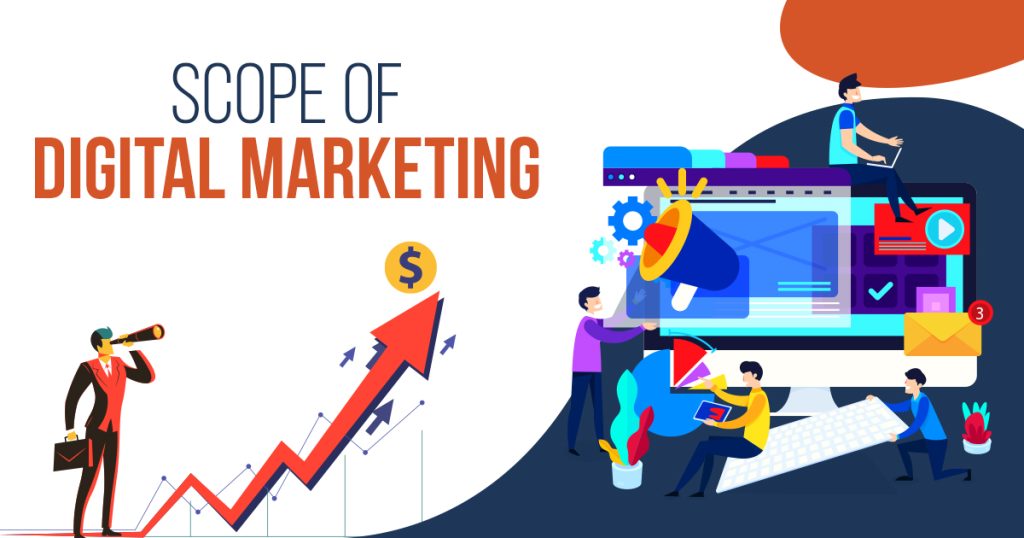
5. Business Scope: Why Organisations Need Digital Marketing
a) Targeting and Personalisation
Digital channels allow businesses to target audiences based on gender, age, location, interests, education etc — far more precisely than mass-media approaches. You can also retarget people who interacted with your brand before, customizing messages to different segments.
b) Reach & Scalability
With digital marketing, companies (large or small) can reach national or even international audiences with relatively modest investment compared to traditional broadcast media. Especially for startups and SMEs, this means the playing field is more level.
c) Measurability & Analytics
One of the major benefits is that digital campaigns can be tracked, measured, optimised. Marketers can see what is working (or not) in real-time, adjust budgets, refine targeting, and thus improve efficiency. As noted by sources, modern digital marketing uses data, analytics and automation.
d) Multi-channel & Omni-channel Engagement
Consumers don’t just see a single channel anymore — they move from social media to search to mobile apps to websites. Digital marketing enables brands to engage across touch-points, blending inbound and outbound approaches, creating interconnected experiences.
e) Competitive Advantage & New Business Models
In many sectors digital marketing is no longer optional but essential. Brands that fail to invest in their digital presence risk losing out. Additionally, new business models (D2C, online marketplaces, subscription services) rely heavily on digital marketing. The growing adoption opens scope for business growth via digital strategies.
In sum, for organisations the scope of digital marketing is broad: from customer acquisition to retention, from brand building to data-driven decisions.
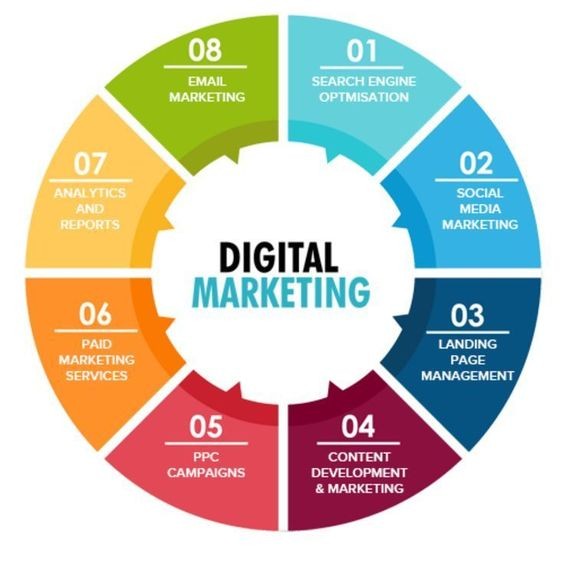
6. Skill & Education Scope: What You Need to Learn
a) Core Skills
To tap into the scope of digital marketing, the following skills are crucial:
- Search engine optimisation (SEO)
- Paid advertising (PPC, display ads, social ads)
- Content creation & strategy
- Social media marketing & community management
- Email marketing & automation
- Analytics & data interpretation
- Mobile marketing, app marketing
Sources reinforce these domains.
b) Emerging / Advanced Skills
As the field matures, additional skills add value:
- Marketing automation & CRM integration
- Artificial Intelligence (AI) and Machine Learning for marketing optimisation
- Video marketing, influencer & affiliate marketing
- Conversational marketing (chatbots, voice)
- Multi-channel campaign planning & omni-channel experience
- Data privacy, compliance and ethical marketing practices
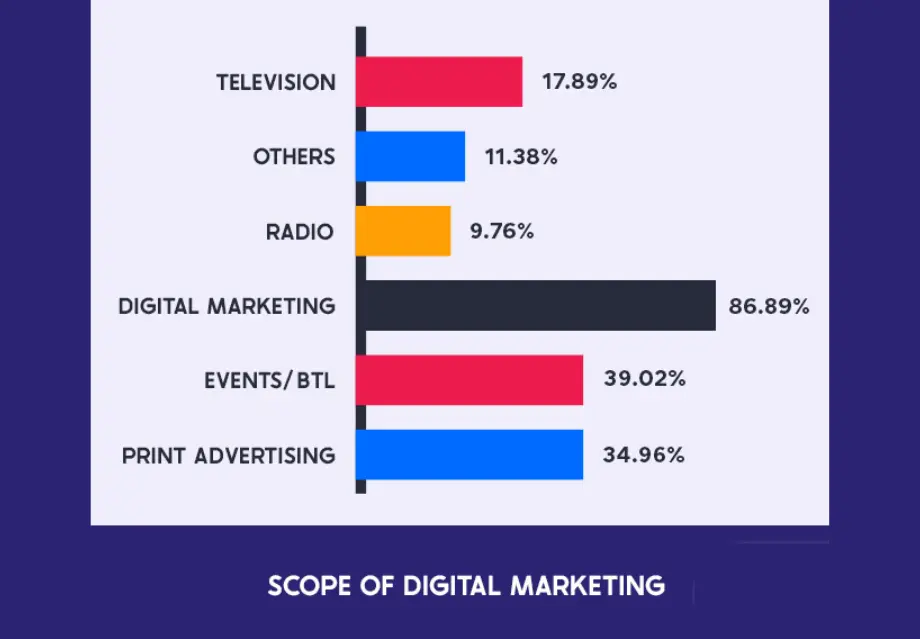
c) Certification & Learning Paths
There are certificate programmes, diploma courses and full-fledged specialisations in digital marketing. For example, institutions highlight digital marketing as a growing field with specific training modules.
d) Lifelong Learning & Upskilling
Because digital marketing evolves fast (platforms change, algorithms update, consumer behaviour shifts), one cannot rely on static knowledge. Continuous upskilling is part of the scope. Even job roles often require adapting to new tech and tools.
Thus, whether you are a student, a marketing professional, or someone switching careers, the skill/education scope in digital marketing is substantial.
7. Specialisation Areas and Future Roles
Given the broad sweep of digital marketing, specialisations are emerging. Some of these are:
- SEO & Content Marketing Specialist: Deep expertise in organic growth and content strategy.
- Performance Marketing / Growth Hacker: Focused on rapid growth, user acquisition, metrics.
- Social Media & Influencer Marketing Manager: Building brand via social platforms, managing influencers.
- Digital Analytics & Data Scientist for Marketing: Turning campaign data into actionable insights.
- AI/Automation Specialist in Marketing: Using AI to personalise, automate, optimise campaigns.
- E-commerce & Omnichannel Marketing Lead: For brands that operate online and offline, integrating channels.
- Consumer Experience / Engagement Manager: Ensuring the digital brand experience across touch-points.
- Freelancer / Consultant / Agency Owner: Working independently or running a digital marketing business.
These specialisations illustrate how the scope is not just “general digital marketer” but many differentiated roles — meaning more opportunities, but also more competition and deeper expertise needed.
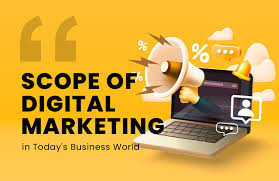
8. Geographical and Industry-wide Scope
a) Across Industries
Digital marketing isn’t limited to one sector. From retail to education, healthcare to financial services, tourism to manufacturing – all have a digital component. As one article notes, the scope covers diverse industries.
b) Global Opportunities
In a connected world, digital marketing skills are often transferable across geographies. Businesses abroad, global clients, remote work models etc mean that scope isn’t just local. Sources point to global reach and remote work as part of the scope.
c) Urban, Rural & Tier-2/3 Markets
Particularly in India, while metro cities have traditionally dominated, Tier-2 and Tier-3 cities are catching up. The digital presence of SMEs and local businesses is growing. Thus the scope is extending beyond big cities.
d) Startups and New Markets
Startups, new business models, digital-first companies are often aggressive in digital marketing. That adds to the scope. Also new markets (for example voice search, vernacular content, regional languages) are opening.
Hence the scope of digital marketing spans geographies, sectors and business sizes.
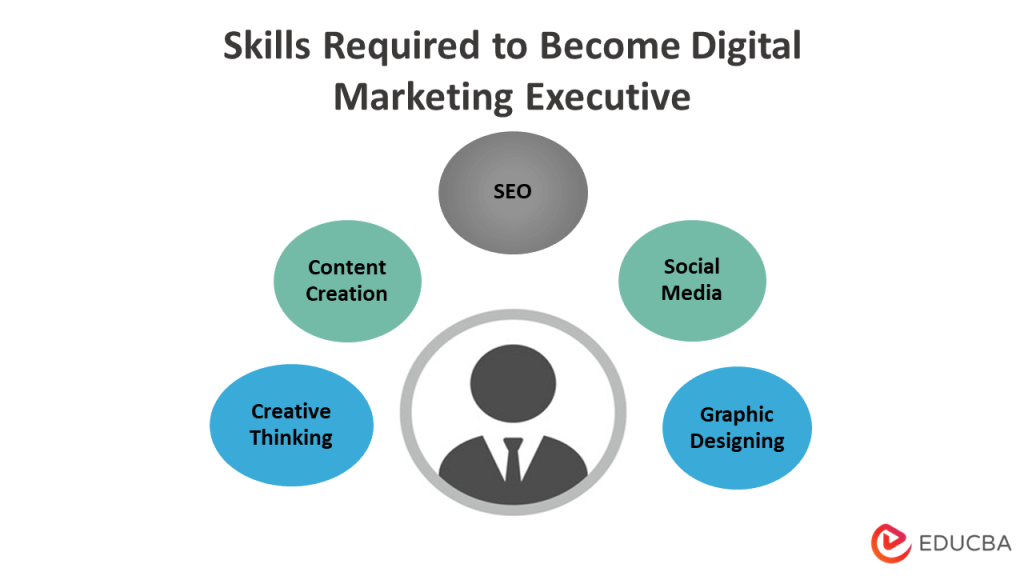
9. Technological Trends & The Scope of Digital Marketing
To understand the full scope of digital marketing, one must look ahead at key technological and behavioural trends:
a) Artificial Intelligence (AI), Machine Learning & Automation
These technologies are reshaping how campaigns are planned, delivered and optimised. As one source explains: “The evolving nature of digital marketing… newly developed roles… technical and creative skills are emerging.”
b) Data, Analytics & Personalisation
Big data, behavioural tracking, predictive analytics allow for hyper-personalised marketing, real-time decisioning and higher efficiency. This enhances the scope of digital marketing in offering customised experiences.
c) Mobile, Voice, Video and Emerging Formats
Mobile marketing continues to grow as more users use smartphones. Voice search, video content (shorts, Reels), AR/VR experiences are gradually becoming part of digital marketing. These expand the scope in new formats.
d) Privacy, Ethical Marketing & Regulation
With greater digital penetration comes more regulation (GDPR, data protection laws), ethical concerns, platform policies. Digital marketers must therefore navigate compliance, adding another layer to the scope.
e) Omnichannel & Integrated Marketing
The future isn’t “digital only” vs “traditional”, but integrated marketing across devices, channels and offline/online. The concept of 5Ds — digital devices, digital platforms, digital media, digital data, digital technology — captures this expansion.
f) Remote Work, Freelancing & Global Teams
As mentioned earlier, remote and freelance work models are more accepted. Digital marketing teams can be distributed globally, which further expands career and business scope.
So, when we look at the future, the scope of digital marketing doesn’t plateau — it multiplies.
10. Challenges & What That Means for the Scope
While the scope is broad, there are also challenges. Understanding these is key to fully appreciating the scope.
a) Rapid Change & Skill Obsolescence
The digital landscape changes fast — algorithm updates, platform policy changes, new tools. If you don’t keep learning, you risk falling behind. This means the scope is dynamic and demands continuous effort.
b) High Competition
Given the attractiveness of digital marketing, many people are entering the field. One reddit post noted:
“Yes it has good scope but it’s going to be very hard … you’ll need good skills otherwise not possible.”
So the scope is there, but one must distinguish oneself.
c) Measurability Comes with Pressure
Because digital marketing is measurable, there is pressure to deliver results, to justify spend, to show ROI. This means marketers need to be not just creative but data-driven and disciplined.
d) Privacy and Platform Dependency
Brands relying heavily on third-party platforms (social media, search engines) face risks: policy changes, algorithm shifts, ad cost increases. Marketers need to hedge by owning audiences (email, first-party data) and being platform-agnostic.
e) Saturation of Some Channels
As more brands adopt digital marketing, some channels become crowded (e.g., Facebook ads, Instagram). Young marketers need to find newer niches, deeper specialisations, or emerging channels to stand out.
These challenges do not reduce the scope — they refine it. In fact, the breadth of opportunities is larger, but the bar is higher for those who wish to succeed.
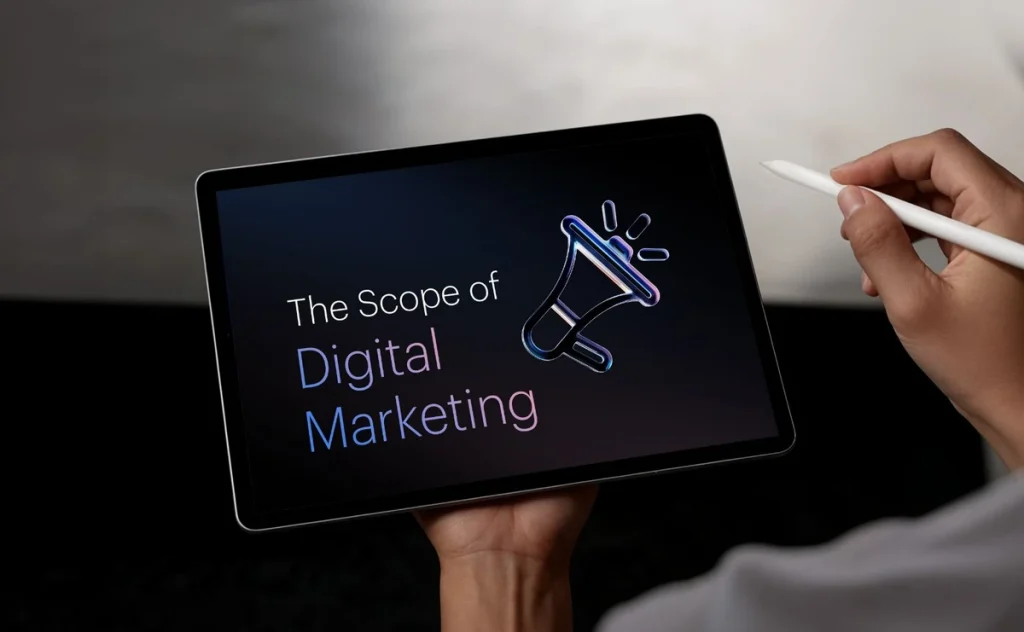
11. How to Leverage the Scope: Practical Tips
If you want to make the most of the scope of digital marketing, here are some practical actions:
- Build a strong foundational skill-set: SEO, social media, analytics, content, paid ads.
- Choose a niche or specialisation: Rather than be a jack-of-all-trades, become very good at one or two areas (e.g., performance marketing + data analytics).
- Get certifications / real-world practise: Practical experience matters more than just certificate. Build campaigns, analyse results, learn tools.
- Stay updated: Follow industry blogs, attend webinars, experiment with new platforms.
